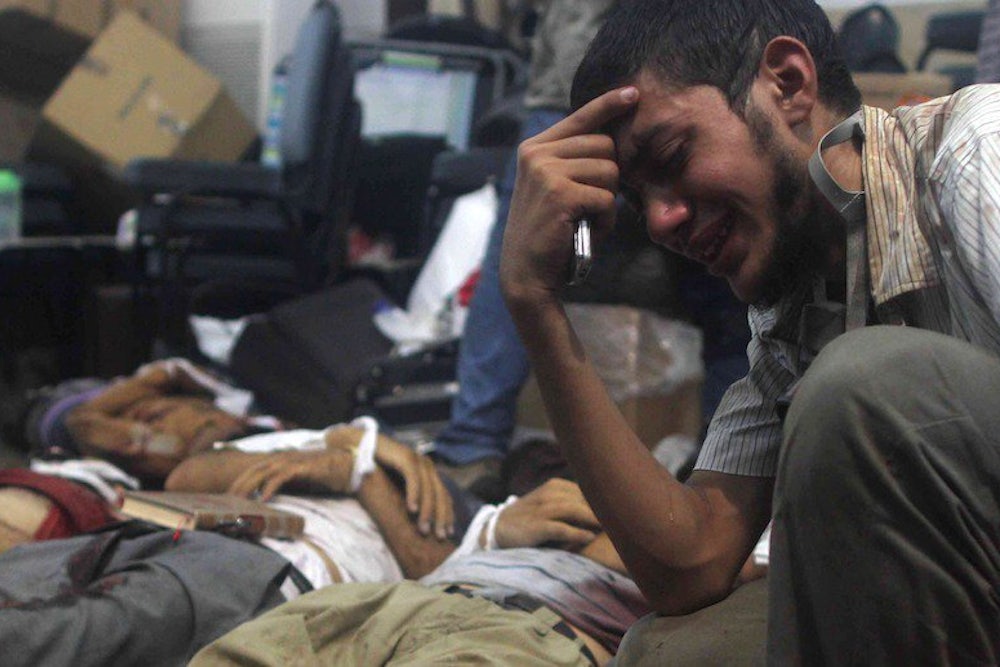Cairo is no longer the capital of Arab hope. It is now the capital of Arab despair. Or so it deserves to be, except that despair does not appear to be the dominant Arab response, and more importantly, the dominant Egyptian response, to the violent destruction of the Egyptian revolution by the Egyptian army. This is the Eighteenth Brumaire of Abdel Fattah el-Sisi. The army has now committed three massacres. Emergency rule has been declared. There are curfews and arbitrary arrests. A puppet civilian government has ratified all the general’s demands. The governance of most of Egypt’s provinces has been given over to the army. Mubarak is almost certainly laughing.
But the military takeover of Egypt is complicated by an astonishing fact: it appears to enjoy the support of a majority of Egyptians. These official atrocities are popular. When Obama remarked that “the Egyptian people deserve better,” he missed the central complexity of this crisis: the Egyptian people, or the majority of it, believe that they deserve this. What are we to make of this fact? One thing is certain: the millions in the square cheering the repressive generals on do not confer any sort of democratic legitimacy upon the generals’ actions. Democracy is not whatever a mob, or a majority, wants. Indeed, democracy was designed to thwart the mob, and set limits to the tyranny of the majority, by reconfiguring it, by means of politics, into a free and self-governing people. For weeks now people have been puzzling over the liberals of Egypt and their enthusiasm for a violent coup. Perhaps the confusion was semantic. It is time to stop calling these people liberals. A military dictator supported by the masses in the streets: there is another name for such a phenomenon, which is not unfamiliar in the annals of modern politics. Its name is fascism. (Which is another name for the wisdom of crowds.)
(READ: Obama Trips Over Himself Again on Egypt)
Is it good news that a majority of Egyptians reject, and loathe, the Muslim Brotherhood? Of course it is. But it is not good news that they loathe them unto violence and dictatorship. They have met the possibility of one dictatorship with the reality of another dictatorship. The Egyptian revolution now seems to have been a contest between two forms of authoritarianism: a religious kind, sectarian, intolerant, and incompetent, which was brought to power in a democratic election, and a secular kind, bent on the persecution of a minority in the name of the majority, which was brought to power by the gun. It is a delusion to think that these strongmen will now give up power. They equate democracy with Muslim Brotherhood rule. Moreover, they are creatures of power, not creatures of justice, and they have returned Egypt to the system of power that characterized it for three decades. Their counter-revolution is a restoration.
“We don’t take sides with any particular party or political figure,” Obama said. It is an unusually revealing statement. In one sense, he is obviously correct, and reasonable: we should not interfere in the politics of another country in a way that usurps the decision-making power of its people. We must be loyal to our principles and to our interests. The problem is that those who champion our principles may not be those who champion our interests. More to the point, the choices that we face are always concrete. The abstraction of principle, the generality of moral discourse, will eventually not suffice for the policymaker, who must throw American power behind particular actors and forces. And worse, the real problem with Obama’s sentence is that it expresses also the president’s temperamental disinclination to take a clear and consistent side in any of the Arab revolutions. The peoples of these convulsing societies have found in him only tactical opacity. “We don’t take sides with any particular party or political figure” was his policy, or non-policy, about the revolt in Iran in 2009, too.
In his response to the hideous events in Egypt, Obama said: “We’ve been blamed by supporters of Morsi; we’ve been blamed by the other side as if we are supporters of Morsi.” He attributed this confusion to a general Egyptian need for a scapegoat for the country’s misfortunes. He should have attributed it to his own lack of clarity when clarity was desperately required. “America cannot determine the future of Egypt,” he added. He is right about that too—but here, too, his reasonableness too closely resembles his own preferred orientation in foreign policy, which is to minimize the agency of the United States around the world. He would like to disguise his preference for withdrawalism as a respect for the self-determination of peoples.
But if America cannot determine the future of Egypt, and Syria and Libya and Iran, America can also do more to determine it than Obama is willing to consider doing. American inaction—since we cannot do almost everything, we will do almost nothing—is not the proper response to the paranoia of frightened peoples about American power. And the denial of the magnitude of American power, and of its relevance, morally and strategically, to the outcomes in societies in the cruel throes of the struggle for democratization, is a delinquence in an American president. A friend of mine, distressed by the damage that Obama has done to the American position in the world, and to the forces of freedom around the world who count on our position, recently suggested a title for the memoir of his presidency that Obama will write when he leaves office. He said it should be called Bearing Witness.
